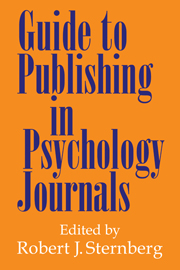13 - Rewriting the Psychology Paper
Published online by Cambridge University Press: 05 February 2012
Summary
Two days ago I had a weekly meeting with a graduate student who is among my best students ever. She had arrived with a Master's degree in hand, and in short order, she wrote a review paper, an empirical article that is about to be sent off for possible publication, and has defended her dissertation prospectus. The agenda for our meeting was to consider predictions made by alternative models that she would evaluate for her dissertation.
Meetings with productive graduate students are the meetings faculty most look forward to, and this was no exception. Before talking about her proposed dissertation, however, the student stated that she had heard from a journal. It took me a second to remember that she had sent her review paper to a journal about 4 months ago. This was the first article she had written for a psychology-related journal, and would be her first sole-authored publication if accepted.
Unfortunately, the news was that her article had been rejected. She handed me the letter from the editor and the sole review. The editor thanked her for sending the manuscript to the journal, and wished her well in revising the article for possible publication elsewhere. I turned to the review. It began in a begrudging, complimentary fashion, noting that the writing was “pretty good” and that the conceptual views reviewed in the manuscript were “interesting.” In the course of my university career, I've read several thousand reviews, either as part of the review process for someone else's work or for my own.
- Type
- Chapter
- Information
- Guide to Publishing in Psychology Journals , pp. 187 - 196Publisher: Cambridge University PressPrint publication year: 2000
- 2
- Cited by



